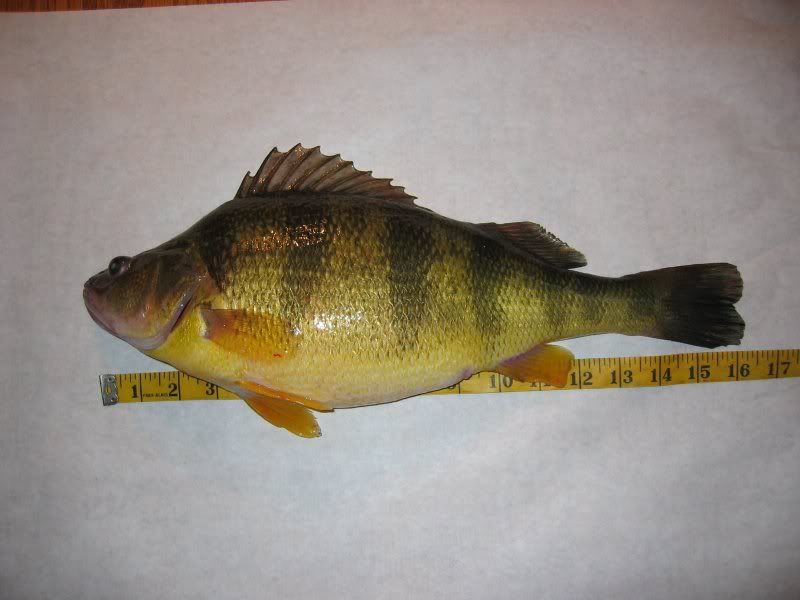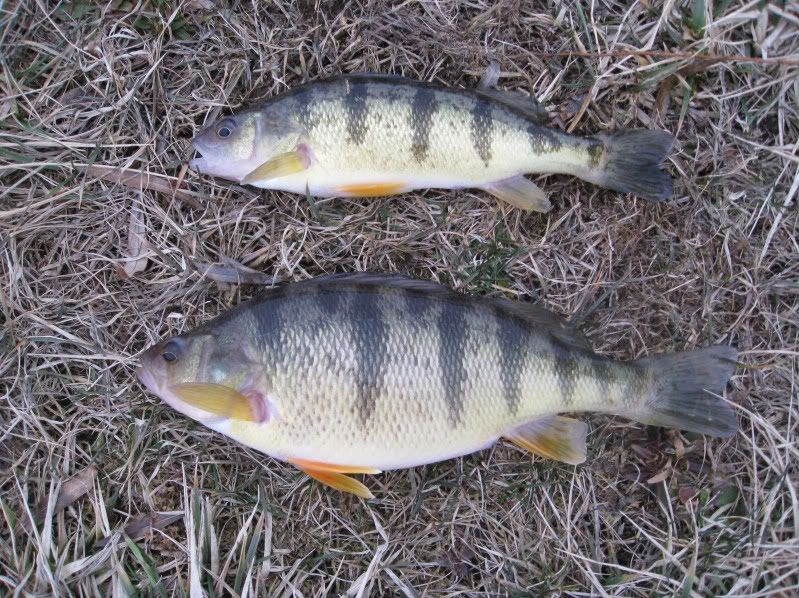December collecting in Connecticut?
#1
 Guest_pkppv_*
Guest_pkppv_*
Posted 30 November 2011 - 04:01 PM
But i digress...I saw some bluegills, a few small largemouths, some sand coloured minnows. As a man who expected to see nothing in such cold weather, i was suprised. I plan on starting a tank for native species, and I really want to keep a few yellow perch. They are stunning, in my opinion. Is december too cold to collect fish up here? Anyone have any experience with late fall collecting? Maybe specifically with perch, or perhaps just with minnows. Thanks!
#2
 Guest_fundulus_*
Guest_fundulus_*
Posted 30 November 2011 - 04:14 PM
#3
 Guest_pkppv_*
Guest_pkppv_*
Posted 30 November 2011 - 04:37 PM
The fish are certainly around. Once it gets really cold with serious ice on the water, fish will usually be in deeper waters and hard to get. But late fall in CT should be workable if you have waders and don't mind putting your hands in cold water. I used to collect pond fish mostly in the Boston area until ice cover got too serious.
I dont expect ice for a few weeks. Whats the best way to collect in the cold water? Traps, nets, ?
#4
 Guest_EricaWieser_*
Guest_EricaWieser_*
Posted 30 November 2011 - 05:13 PM
On page 16 of 21 of this guide it says that yellow perch are classified as panfish. On page 10 of 21 is says the only ways to legally collect panfish are angling, ice fishing, and bobbing. http://www.ct.gov/de...guide_part1.pdfI dont expect ice for a few weeks. Whats the best way to collect in the cold water? Traps, nets, ?
Oh, and here's a link to the page for buying a fishing license. Link: http://www.ct.gov/de...depNav_GID=1630
Yellow perch are pretty cool. You're going to need a large aquarium to keep them though; wikipedia says the maximum recorded length for a yellow perch is 21 inches. You can see how much room a 5 inch yellow perch has in a 600 gallon tank in this video. The longest spotted gar is 16 inches, to give you a frame of reference for how large your perch will grow.
The person says the setup cost them $1500. Looks like it's waterproofed wood.
Edited by EricaWieser, 30 November 2011 - 05:23 PM.
#5
 Guest_pkppv_*
Guest_pkppv_*
Posted 30 November 2011 - 05:34 PM
#6
 Guest_fundulus_*
Guest_fundulus_*
Posted 30 November 2011 - 05:36 PM
#7
 Guest_mywan_*
Guest_mywan_*
Posted 30 November 2011 - 08:16 PM
#8
 Guest_FirstChAoS_*
Guest_FirstChAoS_*
Posted 01 December 2011 - 01:24 AM
Winter happens to just as enjoyable to me for fish (and other water critters) watching trips. What you can expect to see changes over the season (day and night) and in wintertime you often see a lot of things that are more rare to find in other seasons. If you explore the creeks in all seasons you might find find some rather stunning darters and other species in your area as interesting as yellow perch.
He's from New England, we have two darters, both in the same shade of brown. They are very nice darters, but far from colorful.
Winter is tough here as water gets encased in ice and too cold to walk in.
I have been wanting to sample lately but lately it is so cold, dark, and the water has been really high lately. I have waders but sadly their feet leak so are fairly useless. Yes, I am not a morning person (I work 3-11 PM on weekdays and get up around noon or so), so by the time I feel like doing anything it is dark and cold ruining sampling.
#9
 Guest_pkppv_*
Guest_pkppv_*
Posted 01 December 2011 - 08:34 PM
He's from New England, we have two darters, both in the same shade of brown. They are very nice darters, but far from colorful.
Winter is tough here as water gets encased in ice and too cold to walk in.
I have been wanting to sample lately but lately it is so cold, dark, and the water has been really high lately. I have waders but sadly their feet leak so are fairly useless. Yes, I am not a morning person (I work 3-11 PM on weekdays and get up around noon or so), so by the time I feel like doing anything it is dark and cold ruining sampling.
there are darters here?!
#11
 Guest_az9_*
Guest_az9_*
Posted 01 December 2011 - 08:44 PM
He's from New England, we have two darters, both in the same shade of brown. They are very nice darters, but far from colorful.
Winter is tough here as water gets encased in ice and too cold to walk in.
I have been wanting to sample lately but lately it is so cold, dark, and the water has been really high lately. I have waders but sadly their feet leak so are fairly useless. Yes, I am not a morning person (I work 3-11 PM on weekdays and get up around noon or so), so by the time I feel like doing anything it is dark and cold ruining sampling.
I chopped ice today on one of my ponds to remove over a hundred bluegills from a floating cage. With 7 inches of hard crunchy frozen wet snow on the ground it was miserable pumping water from the pond to the hauling tank and carrying the bluegills to the hauling tank via five gallon bucket as I couldn't pull very close to the pond.
Salt is the key in hauling fish and having good survival especially in winter. They are now in a holding tank in a high school green house with the temp slowly rising until tomorrow when they will get a salt dip and will be put in their now home; a 500 gallon recirculating system I put together for the Ag and FFA class. I hope to get pics of it all tomorrow if anyone is interested. A great economical way to hold large number of fish as broodfish or whatever.
I'll be moving about 400 yellow perch YOY into may basement in the next few days. I hope this is it for coldwater harvesting!It's absolutely miserable!
BTW, here is my biggest perch out of one of the ponds. I agree they are stunning fish! 16 1/4 inches and 2.81 pounds. I caught her ice fishing but the state won't let me enter her as a state record as my fish are on a "feeding program." LOL She would shatter our state record by 5 oz.

From my experience and my aquaculture friends perch get big but 99.9 percent of them max out a 15 inches even in the best of conditions and genetics. Most max out in 14 inch range and that's about it. Females also grow faster and get larger than males. If I wanted aquarium fish I'd stick with the males.
Larger female compared to male of the same age.

Edited by az9, 01 December 2011 - 08:45 PM.
#16
 Guest_FirstChAoS_*
Guest_FirstChAoS_*
Posted 03 December 2011 - 01:32 AM
Tesselated darters look cool! Are they easy to find?
Yes, as soon as I learned the trick to where to find them. Don't look at the small riffly headwaters most suggest for darters. Though I HAVE at times seen tesselates in riffles (in one case a suprisingly large amount) and small streams I generally have more luck finding them in the slower stretches of large rivers where their is sand or mud bottom and some occasional scattered debris for hiding places.
habitats besides that (such as the riffles in one stretch of the ashuelot and the submerged vegetation in the connecticut above the Vernon dam )seem to be a rarer choice. But the species DOES seem a bit flexable in terms of habitat.
#17
 Guest_FirstChAoS_*
Guest_FirstChAoS_*
Posted 03 December 2011 - 08:50 PM
There are tesselated and swamp darters in CT. The area is still recovering from the most recent glaciation, sad to say.
In what way are we recovering? I know their is still some geologic uplift in areas as rock can be slow to rebound and glacial landforms like drumlins and roche moutonnee's have yet to erode back down to flat ground. But how else should we recover?
If it is fish wise then I am unsure how glacial recovery can effect that. No new routes other than constant introductions of invasive gamefish by clueless anglers exist for introducing new species. And our fragile subspecies splitting off from larger species fall victim to said gamefish preventing speciation in this area to increase our diversity.
#18
 Guest_fundulus_*
Guest_fundulus_*
Posted 03 December 2011 - 10:54 PM
#19
 Guest_FirstChAoS_*
Guest_FirstChAoS_*
Posted 04 December 2011 - 12:49 AM
Could recover by milder climate, and also recolonization by species that may have been present say, 50,000 years ago in the last interglacial period. Everything in New England is nice and new in its current position, biologically speaking, with low diversity.
Interesting, with nice divisions seperating it from other drainages (mountains, ocean) how would they recolonize? I swear we feel like an island some time when it comes to fish species.
Now I wonder if their is a way to find the actual icthyofauna of the last interglacial? The last glacial did a good job of removing literally millions of years of evidence of previous life with fossils and other ancient evidence being particularly rare.
#20
 Guest_fundulus_*
Guest_fundulus_*
Posted 04 December 2011 - 10:57 AM
Reply to this topic
0 user(s) are reading this topic
0 members, 0 guests, 0 anonymous users







